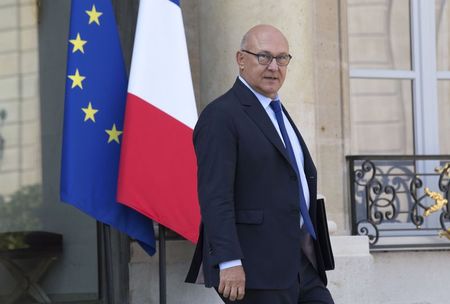By Francesca Landini and Martin Santa MILAN (Reuters) - France faced harsh criticism on Friday for failing to meet a deadline to put its finances in order, as frustrated euro zone ministers struggled to keep alive their post-crisis strategy for the bloc's stagnating economy.
Emboldened by the European Central Bank's shift away from austerity, France said this week it will not reduce its budget deficit to within EU limits until 2017, despite having already been granted extra time to do that by 2015.
France's announcement went down badly with euro zone finance ministers meeting in Milan. Some saw it as an affront after the painful cuts many governments have implemented to bring down swollen deficits and win back investor confidence.
"France got it big time," said one senior euro zone official of the criticism doled out at the meeting. Another said no one directly pointed the finger at French Finance Minister Michel Sapin, "but ministers were very unhappy".
European Central Bank President Mario Draghi later told reporters that EU budget rules "should not be unraveled", while Jeroen Dijsselbloem, the Dutchman who chaired the meeting, said the rules were the "anchor of confidence" in the European Union.
Markets have so far retained confidence in France's highly liquid debt, but euro zone policymakers are anxious to show that governments can be responsible and live within their means.
Tougher surveillance of government finances is one of the euro zone's most far-reaching responses to its debt crisis. It is aimed at avoiding a repeat of free-spending years that saddled the bloc with massive debts and weakened its economy.
While economists doubt the wisdom of severely restricting government spending at a time of weak growth, France, as the euro zone's second largest economy, had been expected to set an example and show budgetary discipline.
Paris' admission is especially grating for ministers because French economic growth last year was actually stronger than expected by the European Commission -- instead of a contraction of 0.1 percent, there was growth of 0.3 percent.
An EU country breaking budget rules can be fined, but given the unpopularity of French President Francois Hollande and the fragility of his government, Paris may be spared any punishment.
France's Sapin played down the issue and said there was little tension surrounding it.
"We want to have a dialogue with the Commission and our partners to find a solution," Sapin told reporters. "What struck me during the day was that everyone had this attitude, that they wanted to find a solution."
Paris has led calls for a more flexible interpretation of EU budget rules along with Italy, taking into account its efforts to reform its economy.
Yet some euro zone officials said that France had done very little in terms of reforms since it was granted more time for deficit reduction in June 2013.
Euro zone countries must now submit their 2015 draft budgets to the European Commission, the EU executive, and ministers will reconvene in November to discuss what steps to take with France.
300-BILLION-EURO PLAN
The disarray surrounding France clouded the Milan meeting that was meant to find ways to relaunch the euro zone's economy, which stagnated in the second quarter and risks falling back into its third recession since 2008.
Investment is the new buzzword among ministers, along with more government action to push structural reforms and smarter spending. There is recognition that record low interest rates and ECB bond-buying will not alone solve the euro zone's malaise.
The incoming president of the European Commission, Jean-Claude Juncker, wants a 300 billion-euro ($410 billion) investment program to revive the European economy.
The euro zone's investment spending in 2013 was 15 percent less than it was before the region's debt crisis in 2010, according to a Franco-German paper that ministers will discuss in Milan.
Jyrki Katainen, the EU's top economics official, who will oversee growth policies in the new Commission, tried to strike a balance. Countries need to change the way they spend public money, he said, and focus on things that generate growth and jobs, such as public works and research and innovation.
"Without reforms, we won't have growth," said Katainen. No country is immune from challenges to reform."
Structural reforms take time, though. With euro zone unemployment near a record high, ministers are looking for more urgent ways to get young people back into work.
One option is to create a pan-European market where smaller companies can raise capital, according to a document prepared for a full EU finance ministers meeting on Saturday.
The aim is to reduce companies' reliance on banks by establishing the kind of funding offered by U.S. bond markets.

Smaller companies, often with fewer than 10 employees, provide two out of every three private-sector jobs in the European Union, according to the European Commission. Helping them to grow is crucial to lowering record joblessness.
(Reporting by Robin Emmott, James Mackenzie, Gavin Jones, Francesca Landini, Martin Santa, Jan Strupczewski, Valentina Za, Silvia Aloisi, Giulio Piovaccari; Writing by Robin Emmott; Editing by Mark Trevelyan)
